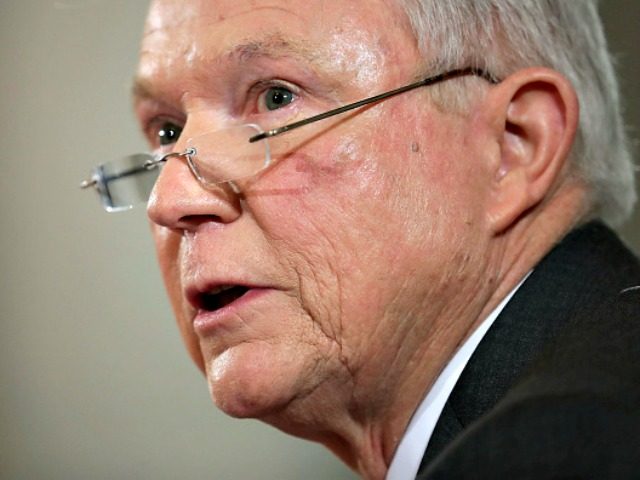Democrats’ overcaffeinated cries over Attorney General Jeff Sessions’ statements on Russian contacts is an attempt to obfuscate the plain truth: Sessions’ pledge to recuse is an act of statesmanship, not a suggestion that he did anything wrong. It was also brilliant politics.
Yesterday, even though President Trump publicly declared that he was not asking for it or thought it necessary, Sessions announced that he would recuse himself from any investigation involving the Trump campaign. This would include any investigation of any alleged contacts between the campaign and officials in the Russian government.
Normally, if the attorney general is recused on a matter, then the deputy attorney general is in charge. If there is no deputy, then the associate attorney general is in charge. If there is no one in that office either, then the solicitor general is in charge. If that person is not around, then you start going through more than a half-dozen assistant attorneys general.
But only two of those senior posts even have a nominee at this point, and none of them have yet been confirmed by the Senate. So per the executive order governing the order of succession for the Department of Justice (DOJ), the U.S. Attorney for the Eastern District of Virginia, Dana Boente, is the acting attorney general for any decisions on appointing a special prosecutor, ordering an investigation, or taking any other DOJ actions. Boente was appointed by Barack Obama in 2015.
As soon as the Republican-led Senate confirms Rod Rosenstein as deputy attorney general or Rachel Brand as associate attorney general, those Trump appointees would take the positions immediately under Sessions and would make all DOJ decisions for any matter where Sessions is recused
But for now that power resides in an official appointed by a president of the opposition party, albeit an official with a long service record in administrations of both parties.
Recusal has nothing to do with any wrongdoing, a critical fact that establishment media commentators conveniently seem to forget. For investigators (such as many people in DOJ), recusal is appropriate when a reasonable observer might question the investigator’s impartiality.
This is critically important when it comes to courts of law and law enforcement. Federal law requires judges to recuse themselves if a family member is involved or they have any financial stake in an outcome. Beyond that, judges recuse themselves whenever there is any other objective basis to question their impartiality. When they do so, it is never considered a sign of wrongdoing; it is about giving the people every reason to have faith in the institutions of justice.
But recusal is not a blank check to block those officials from doing their jobs. For example, federal judges with a history of pro-life affiliations before they became judges frequently will be called upon to recuse themselves on abortion cases. They rightly refuse to do so in such cases. Merely having personal views on an issue (and everyone in public life has a personal view on abortion) does not mean that a government official cannot be trusted to follow the law.
Sessions concluded that since he was heavily involved with the Trump campaign, reasonable people might wonder if he was truly impartial if he was called upon to investigate campaign staff. There is no evidence of any partiality, favoritism, or personal improper involvement; but recusal can occur even when there is no evidence that it is necessary.
In Sessions’ case, this means that even though no one has made any sort of evidence-supported allegation that he engaged in any improper communications, for the sake of the credibility of DOJ and the White House, he would have someone else lead the investigation.
This is an act of pure statesmanship, rarely seen in Washington. By announcing that he would forfeit authority that he rightly holds—granted to him by the president of the United States and the U.S. Senate, filling an important office in the life of the nation—he is putting public perception ahead of political expediency. He is showing faith in the American people and trusting that the justice system will operate the way it is supposed to without him.
“Caesar’s wife must be above reproach,” Shakespeare wrote in Julius Caesar. Sessions does not wish to present any stumbling blocks to Americans who are not currently supporters of the president who appointed him. If stepping aside on this issue gives them one more reason to trust President Trump and his administration, then apparently that is what the attorney general is willing to do.
The manner in which Sessions announced his decision showcased grace, class, and humility. He had a solid press conference, fully answered the questions put to him, then went on primetime television to answer still more questions. He looked like a public servant trying to be forthright and transparent with the public.
Sessions’ decision will also redound to Trump’s political benefit. This shuts down what would otherwise be a recurring line of attack against him. The public does not know whether DOJ is investigating anything about Russian ties to the presidential campaign because such investigations can occur in secret.
But now the public does know that the person deciding whether there is sufficient evidence to warrant such an investigation has unquestionably clean hands. For the time being, an Obama appointee is calling the shots. While leftwing partisans may continue to cry foul, reasonable Americans will continue to have faith in equal justice under the law.
Conservatives have long admired Jeff Sessions. Now Middle America can see why.
Ken Klukowski is senior legal editor for Breitbart News. Follow him on Twitter @kenklukowski.

COMMENTS
Please let us know if you're having issues with commenting.